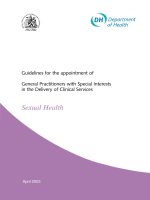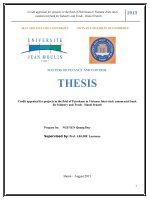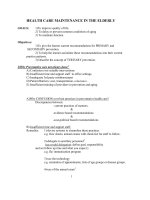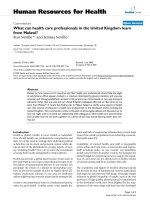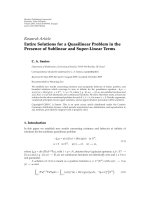Continuing Education Programmes for Health Care Providers in the Field of Prevention of Chronic Diseases pdf
Bạn đang xem bản rút gọn của tài liệu. Xem và tải ngay bản đầy đủ của tài liệu tại đây (254.12 KB, 90 trang )
World Health Organization
Regional Office for Europe
Copenhagen
Therapeutic Patient
Education
Continuing Education Programmes
for Health Care Providers
in the Field of
Prevention of Chronic Diseases
Report of a WHO Working Group
1998
ISBN 92 890 1298 6 EUR/ICP/QCPH 01 01 03 Rev.2
1998 ORIGINAL: ENGLISH
Abstract
Therapeutic Patient Education (TPE) enables people with chronic diseases to
manage their illness and yields benefits in both health and financial terms. Many
health care providers, however, lack the skills to provide their patients with such an
education. The Regional Office therefore convened a working group to prepare a
document specifying the content of programmes for teaching health care providers
to provide TPE. The Working Group comprised doctors, nurses, other health care
providers and educators from countries throughout the European Region. The
Group developed a document that defines TPE, specifies the different skills that
patients with chronic diseases should be taught, and describes the content and
structure of several TPE programmes of increasing complexity. The Group also
identified obstacles to be overcome and recommended action to be undertaken by
health care institutions and educators, countries and WHO and its collaborating
centres, as well as health industries, health insurance providers and the media.
Keywords
PATIENT EDUCATION
CHRONIC DISEASE
HEALTH PERSONNEL – education
TEACHING MATERIALS
EUROPE
© World Health Organization
All rights in this document are reserved by the WHO Regional Office for Europe. The docu-
ment may nevertheless be freely reviewed, abstracted, reproduced or translated into any
other language (but not for sale or for use in conjunction with commercial purposes) provided
that full acknowledgement is given to the source. For the use of the WHO emblem, permis-
sion must be sought from the WHO Regional Office. Any translation should include the
words: The translator of this document is responsible for the accuracy of the translation. The
Regional Office would appreciate receiving three copies of any translation. Any views ex-
pressed by named authors are solely the responsibility of those authors.
iii
Contents
Page
Working Group on Therapeutic Patient Education v
Acknowledgements vi
1. Therapeutic patient education: educational considerations 1
Introduction 1
The need to train health care providers in therapeutic
education of patients with chronic diseases 3
The need for educational programmes in
therapeutic patient education 6
General considerations 8
Basic considerations concerning educational
programmes for health care providers in
therapeutic patient education 12
Elements of an educational programme 13
Network of basic educational principles 14
Programme framework 15
2. Competency profiles of therapeutically
educated patients 17
Competencies of type 1 diabetic patients 17
Competencies of type 2 diabetic patients 20
Competencies of asthma patients 22
Evolution of patients’ attitudes 24
3. Competency profiles of health care providers 25
Competencies in patient-based therapeutic
patient education 26
4. Educational programmes for health care providers in
therapeutic patient education 29
Considerations on the number of participants
and the course duration 29
Introduction to therapeutic patient education
Programme (A) 30
iv
Introduction to therapeutic patient education
Programme (B) 35
Implementation of therapeutic patient education
Programme (C) 38
Coordination of therapeutic patient education programmes
Programme (D) 52
Bibliography: an educational tool 54
5. Obstacles 57
Common obstacles to educational programmes in
therapeutic patient education for health care providers 57
6. Recommendations
Recommendations to health care providers 61
Recommendations to educational institutions
for health care providers 62
Recommendations to health care institutions 63
Recommendations to
WHO collaborating centres 63
Recommendations to the health industries 63
Recommendations to health insurance companies 64
Recommendations to the media (print, audio, video) 64
Recommendations to Member States of
WHO 64
Recommendations to the
WHO Regional Office
for Europe 65
Annex Index/Glossary 67
v
Working Group on Therapeutic Patient Education
11–14 June 1997
Members
A
NTSIFEROV, MIKHAIL B., Head Endocrinologist, National Centre for
Endocrinology, Moscow, Russia
C
OSTEA, MARIANA, Psychologist, Institute of Nutrition and Metabo-
lism, Bucharest, Romania
F
ELTON, ANNE-MARIE, Registered Nurse, Chairperson, Federation of
European Nurses in Diabetes, London, UK (Vice-Chair)
G
AGNAYRE, RÉMI, Département de Pédagogie des Sciences de la San-
té, Université Paris-Nord, Bobigny, France
M
ALDONATO, ALDO, Istituto Clinica Medica 2, Policlinico Umberto I,
Rome, Italy (Chair)
P
ACCAUD, URSULA, Registered Nurse, Directrice Adjointe, Départe-
ment des Soins Infirmiers, Hôpitaux Universitaires de Genève, Swit-
zerland
P
ETRENKO, VLADIMIRAS, Head, Department of Diabetology, Aca-
demic Clinics, Kaunas, Lithuania
R
OSENQVIST, URBAN, Department of Social Medicine, Akademiska
sjukhuset, Uppsala, Sweden
V
ISSER, ADRIAAN, European Editor, Patient Education and Counsel-
ling, Helen Dowling Institute for Biopsychosocial Medicine, Rotter-
dam, Netherlands (Rapporteur)
Secretariat
A
METOV, ALEXANDER S., Head, Chair of Endocrinology, Russian
Academy for Advanced Medical Studies, Moscow, Russia (temporary
adviser)
A
SSAL, JEAN-PHILIPPE, Chief, Division of Therapeutic Patient Educa-
tion for Chronic Diseases, Hôpitaux Universitaires de Genève, Swit-
zerland (convenor)
F
AWCETT-HENESY, AINNA, Regional Adviser for Nursing, WHO Re-
gional Office for Europe, Copenhagen, Denmark
G
UILBERT, JEAN-JACQUES, Consultant, Division of Therapeutic Pa-
tient Education for Chronic Diseases, Hôpitaux Universitaires de
Genève, Switzerland (Secretary)
J
ACQUEMET, STEPHANE, specialist in adult education, Division of
Therapeutic Patient Education for Chronic Diseases, Hôpitaux Uni-
versitaires de Genève, Switzerland (temporary adviser)
K
ALO, ISUF, Regional Adviser, WHO Regional Office for Europe,
Copenhagen, Denmark
vi
Acknowledgements
The WHO Working Group on Therapeutic Patient Education ac-
knowledges the valuable contributions to its work made by the follow-
ing colleagues in the preparation of working papers.
BERGER, MICHAEL, Director, Medizinische Klinik & Poliklinik, Heinrich
Heine Universität, Düsseldorf, Germany
C
HASTONAY, PHILIPPE, Institute of Social and Preventive Medicine,
University of Geneva, Switzerland
D
ECCACHE, ALAIN, Director, Health Education Unit, Faculty of
Medicine, Catholic University of Louvain, Brussels, Belgium
D
OMINICE, PIERRE, Professor, Director of Continuing Education, Fac-
ulty of Psychology and Education Science, Geneva, Switzerland
E
ULLER-ZIEGLER, Liana, Professor, Department of Rheumatology,
University Hospital Centre, Nice, France
G
OLAY, ALAIN, Privat Docent, Research Associate, Division of
Therapeutic Patient Education for Chronic Diseases, Hôpitaux Uni-
versitaires de Genève, Switzerland
G
RABAUSKAS, VILIUS, Rector, Medical Academy, Kaunas, Lithuania
I
VERNOIS (d’), JEAN-FRANÇOIS, Director, Department of Health Sci-
ences Education, Faculty of Medicine, University Paris-Nord, Bo-
bigny, France
J
UNOD, ALAIN, Professor, Medical Director, Hôpitaux Universitaires
de Genève, Switzerland
L
ACROIX, ANNE, Psychologist, Division of Therapeutic Patient Edu-
cation for Chronic Diseases, Hôpitaux Universitaires de Genève,
Switzerland
O
ERTEL, WOLFGANG, Philips University, Marburg, Germany
P
ARTRIDGE, MARTYN R., Consultant Physician, Chest Clinic, Whipps
Cross Hospital, London, United Kingdom
P
OSTEL-VINAY, A., Paris, France
S
HATCHKUTE, AUSHRA, Regional Adviser for Chronic Disease Pre-
vention, WHO Regional Office for Europe, Copenhagen, Denmark
W
ALDVOGEL, FRANCIS, Professor, Director, Department of Internal
Medicine, Hôpitaux Universitaires de Genève, Switzerland
vii
Special thanks are due to the Servier Research Group for its financial
contribution through the Diabetes Study Group of the European Asso-
ciation for the Study of Diabetes, and to all the colleagues from the
three WHO collaborating centres:
B
ELGIUM: Health Education Unit (RESO) Faculty of medicine, Catho-
lic University of Louvain, Brussels (B)
F
RANCE: Department of Health Sciences Education, Faculty of medi-
cine, Université Paris-Nord, Bobigny (F)
S
WITZERLAND: Division of Therapeutic Patient Education for Chronic
Diseases, Hôpitaux Universitaires de Genève (CH)
viii
Notice
In order to help readers unfamiliar
with the technical and educational
terms used in this report, an Index/
Glossary is provided in the Annex
(pages 67-76).
All the terms defined in the Glossary
are marked with an asterisk (*)
throughout the text.
1
Therapeutic patient
education: educational
considerations
INTRODUCTION
This report has been prepared in response to a request from the Re-
gional Office for Europe of the World Health Organization
(WHO/EURO) in November 1996 “to prepare a document indicating
the content of a specific education* programme for health care pro-
viders in the field of prevention of Chronic diseases* and therapeu-
tic patient education*. Its aim is: to help health care providers acquire
the competencies to help patients to self-manage their chronic disease.
The authors have taken account of the orientations and recommenda-
tions promoted by WHO on the education* of health care providers*
and of patients, in particular the targets for health for all, of the Re-
gional Office for Europe
1
, designed to reorient such education* to
making healthy lifestyles* the lifestyles* to choose. They have at-
tempted to apply principles also promoted by WHO that “education*
should be oriented to the health needs* of the population and of the
patients”
2
, and that “learners should gradually become the architects
of their own education*”
3
. They have taken into account also the
1
Targets 4: Adding health to life; 15 and 16: Knowledge and motivation,
and Promotion of healthy behaviour; 29: Providers of primary health care; 31:
Ensuring quality of care; 36 and 37: Human resources* development.
2
The Ljubljana Charter on Reforming Health Care, 19 June 1996.
3
Community-based education of health personnel. WHO Technical Re-
port Series, No. 746, 1987; Learning together to work together for health.
WHO Technical Report Series, No. 769, 1988. Continuing education for
change. WHO Regional Publications, European Series, No. 28, 1990.
2
recommendations of the 1996 Ljubljana Charter on Reforming Health
Care on training in teamwork with multiprofessional and interdisci-
plinary cooperation, a problem-solving approach* and active patient
involvement in managing their chronic disease.
These are ambitious orientations and recommendations and they
are faced by formidable challenges. They go against the conventional
practice of most health professional schools. They are difficult but not
impossible to implement. Indeed, WHO orientations that many have
considered utopian have been realized. It has taken time and effort,
resources*, diplomacy and patience. In many respects, what this report
proposes is already in operation, albeit informally and on a small
scale.
Those who set out to implement what this report proposes will
need to make a careful choice of strategies* of change, and decide
whether conditions in their own institutions favour such strategies*.
They should realize, for example, that an attempt to introduce change
in unprepared institutions would fail unless their academic staff were
offered guidance and assistance. They should debate whether it would
be a waste of energy and of precious institutional resources* to con-
tinue to condone inefficient educational practices for no reason other
than that their own conventionally oriented teachers find such prac-
tices easy and convenient. They should then consider whether it would
be fair to expect their conventionally oriented teaching* staff to im-
plement, without help or guidance, educational programmes* such as
those proposed, and should provide for them a teacher training pro-
gramme*, which they are required to take. They should prepare their
own implementation plan* to guide them and to facilitate change in
their own health care institutions. One of the aims of this report is to
help them prepare such a plan.
The WHO European Region has almost five million nurses; they
constitute the largest health care provider* group. Their actual and
potential contribution to the management* of chronic disease* is un-
der-acknowledged and under-used. Many other types of health care
provider* are similarly under-acknowledged and under-used. Access
by all to recognized programmes of therapeutic patient education* and
disease-specific management* in a multidisciplinary and monodisci-
plinary system should make a significant contribution to the manage-
ment* of chronic diseases*.
3
The recommendations contained in this report are addressed not
only to the education* and training area but also to several others, par-
ticularly the responsible government ministries or departments, educa-
tional institutions, health care providers and consumers, the media,
health insurance companies, the health industries, and the WHO Re-
gional Office for Europe.
THE NEED TO TRAIN HEALTH CARE PROVIDERS IN
THERAPEUTIC EDUCATION OF PATIENTS WITH CHRONIC
DISEASES
The status of therapeutic patient education in the treatment
of chronic diseases
In health care practice outside the hospital, about 80% of the diseases
treated are chronic. Although much of the treatment is remarkably
efficient as a result of, inter alia, medical research, its quality is often
far from satisfactory. Many patients do not comply* with instructions;
fewer than 50% follow their treatment correctly. It has been observed
that patients are inadequately informed about their condition and that
few have been helped to manage or take responsibility for their treat-
ment. Though most physicians are highly competent in diagnosis and
treatment, too few educate their patients to manage their condition.
There may be several reasons for failing to educate patients, such as
too little time or lack of awareness of the need to do so. One reason is
that the initial training of most health care, especially medical-care,
providers is based principally on diagnosis and selection of a
therapeutic regimen.
Though acutely ill patients may benefit from therapeutic patient
education*, it appears to be an essential part of treatment of long-term
diseases* and conditions, such as those listed below
4
:
Allergies
Cancers (and sequelae)
Cancer (all sites)
Stomas (laryngotomy, gastroenterostomy)
4
Excerpt from World Health Report 1997, Geneva, World Health
Organization, 1997.
4
Blood
Haemophilia
Thalassaemias
Circulatory system
Arterial hypertensive disease
Cardiac insufficiency
Cerebrovascular disease (stroke)
Claudication
Ischaemic heart disease, angina
Rheumatic heart disease
Digestive system
Cirrhosis
Colitis
Crohn’s disease
Gastroduodenal ulcer
Malabsorption
Endocrine, nutritional and metabolic disorders
Addison’s disease
Diabetes mellitus
Obesity
Thyroid gland dysfunction
Infections
HIV/AIDS
Poliomyelitis (sequelae)
Tuberculosis
Mental and behavioural disorders
Alcohol, drugs, tobacco and other substance abuse
Alzheimer’s disease and Dementia
Depression
Musculoskeletal system and connective tissues
Arthritis and allied conditions
Fibromyalgia
Limb amputation, fractures, burns (sequelae)
Neck and back disorders
Osteoarthritis
Osteoporosis
Rheumatoid arthritis
Nervous system
Epilepsy
Hearing loss, deafness
Multiple sclerosis
Paraplegia, tetraplegia and other traumatic brain injuries
Parkinson’s disease
Visual disability, blindness
Respiratory system
Bronchial asthma
Chronic obstructive pulmonary disease
Cystic fibrosis
5
Renal disorders
Dialysis
Renal insufficiency
Other
Occupational injuries (sequelae)
Organ transplant (sequelae)
Different types of therapeutic patient education* have been intro-
duced in various health care settings but they have often been arbitrar-
ily designed and poorly taught. There is an obvious need for better-
quality educational programmes* with a therapeutic intent. Often pa-
tients begin to cope with their disease on their own, but health care
providers* should use therapeutic patient education* to make their
patients’ efforts more productive
5
.
The concept of therapeutic patient education
Health care providers* tend to talk to patients about their disease
rather than train them in the daily management* of their condition.
Therapeutic patient education* is designed therefore to train patients
in the skills* of self-managing or adapting treatment to their particular
chronic disease*, and in coping* processes and skills*. It should also
contribute to reducing the cost* of long-term care to patients and to
society. It is essential to the efficient self-management* and to the
quality of care of all long-term diseases* or conditions, though acutely
ill patients should not be excluded from its benefits. Therapeutic pa-
tient education* is education* managed by health care providers
trained in the education* of patients, and designed to enable a patient
(or a group of patients and families) to manage the treatment of their
condition and prevent avoidable complications, while maintaining or
improving quality of life. Its principal purpose is to produce a therapeu-
tic effect additional to that of all other interventions (pharmacological,
physical therapy, etc.).
Target groups
Educational programmes* should be tailored to the different types of
health care provider* engaged to various degrees in the care of pa-
tients with chronic diseases*. These are mainly physicians, nurses,
dieticians, pharmacists, physiotherapists, ergotherapists, psychiatrists/
5
Assal, J-Ph. et al. Patient education 2000. New trends in patient edu-
cation. International Congress Series 1076, Elsevier, Amsterdam, 1995.
6
psychologists, social workers, occupational health specialists, and chi-
ropodists.
Other professional categories should be informed about and take
part in therapeutic patient education*. They include specialists in edu-
cation*, health insurance specialists, hospital administrators, school
health educators and others.
THE NEED FOR EDUCATIONAL PROGRAMMES
IN THERAPEUTIC PATIENT EDUCATION
Programmes of therapeutic patient education* are urgently needed, for
several reasons:
The need for reference training programmes for health care
providers
According to the recommendations of the WHO Regional Office for
Europe on improving quality of care, the approaches presented in this
report could serve as a reference for therapeutic patient education*
and long-term care.
The therapeutic effect of patient education on the control of a
disease
Therapeutic patient education* has brought about a significant de-
crease in the number of hospital admissions of patients with bronchial
asthma or diabetic coma. In addition to a decrease of lower limb am-
putations it has resulted in a better quality of life by delaying amputa-
tions in 75% of cases
6
.
There is a need to emphasize the role of patients’ families and
significant others in long-term care. Therapeutic patient education* of
quality must include the educational and psychological-support roles
of the families and significant others of patients receiving long-term
care. It is essential to the long-term well-being of patients that their
family members understand their difficulties and realize that their as-
sistance to the patients can be of considerable value.
6
Assal, J-Ph. et al. The cost of training a diabetic patient. Diabète &
Métabolisme 19: 491-5 (1993).
7
From empirical good sense to a formal training programme
Over the last decade in the WHO European Region the health profes-
sions have been under some pressure to promote patient education* as
a major addition to pharmacological, physical and other forms of thera-
py. Nevertheless, health care providers still need efficient educational
programmes* in the long-term management* of chronic diseases*. Cur-
rent programmes do not usually include educational methods or psy-
chological support of patients. Their methodology has never been
adequately formalized and this creates difficulties in educating other
health care providers*. Bibliographical review has shown that less
than 5% of articles on patient education* describe the educational pro-
cess and the methods used
7
.
Need for standards in therapeutic patient education
Educational programmes* such as those presented as examples in this
report should equip health care providers* with standards that would
enable them to plan, implement and evaluate high-quality therapeutic
patient education* for chronic diseases*. Two sets of criteria are
needed: for the expected outcome of care for patients, and for the
quality of the educational process. Care providers and educational
specialists would then perform periodic evaluation* against those cri-
teria.
The educational principles of proposed programmes and their
local implementation
The programmes outlined as examples in chapter 4 deal with basic
educational principles and list competencies to be mastered in relation
to patient education*, to how patients can cope* with their disease,
and to long-term care. Programmes of recognized quality should serve
as models that health centres could gradually adopt in their own time
and by their own means. Such model programmes will need to be
adapted to local circumstances and constraints*, provided the adapta-
tions do not contradict the basic principles.
The road to life-long learning and long-term care
Treatment of long-term diseases* is less satisfactory than it might
be. Quality of care still depends considerably on skills* of patients
7
Jacquemet, S. et al. Educational methodologies: an analysis of chaos.
Diabetologia, Vol. 40, Supp.1, PS64:2447, June 1997.
8
for the day-to-day management* of their disease, in addition to drugs
and other forms of medical technology. Although health care provid-
ers* in general and physicians in particular are competent in diagno-
sis and selection of medication, they have in general been taught nei-
ther the skills* of therapeutic patient education* nor methods of effi-
cient long-term care. The proposed programmes would fill this need.
They should be part of the life-long learning* of health care provid-
ers* and could also be included in basic professional education* and
in the education* of specialists in long-term care.
Health care providers* trained in those educational skills* may con-
tribute to:
· improved quality of life, as well as longer life, of their long-term-
care patients;
· improved quality of care in general (as acutely ill patients should
also benefit from those educational skills*);
· lower medical, personal and social costs*, and ultimately lower
global costs*.
GENERAL CONSIDERATIONS
Therapeutic patient education* should enable patients to acquire and
maintain abilities that allow them to optimally manage their lives with
their disease. It is therefore a continuous process, integrated in health
care. It is patient-centred; it includes organized awareness, informa-
tion, self-care learning* and psychosocial support regarding the dis-
ease, prescribed treatment, care, hospital and other health care set-
tings, organizational information, and behaviour* related to health and
illness. It is designed to help patients and their families understand the
disease and the treatment, cooperate with health care providers*, live
healthily, and maintain or improve their quality of life.
Recommended criteria
Therapeutic patient education* is a systemic, patient-centred learning
process.
It takes into account:
· the patient’s adaptation processes (coping* with the disease, lo-
cus of control, health beliefs*, and sociocultural perceptions);
9
· subjective and objective* needs of patients, whether expressed or
not.
It is an integral part of treatment and care.
It concerns the patient’s daily life and psychosocial environment,
and it engages as much as possible the patient’s family and other close
relatives and friends.
It is a continuous process, which has to be adapted to the course
of the disease and to the patient and the patient’s way of life; it is part
of the long-term care of the patient.
It has to be structured, organized and systematically provided to
each patient through a variety of media.
It is multiprofessional, interprofessional and intersectoral*, and
includes networking*.
It includes an evaluation* of the learning process* and its effects.
It is provided by health care providers* trained in the education*
of patients.
Levels of training in therapeutic patient education
As a prelude to formal training in therapeutic patient education* an
introductory course is recommended to motivate interested prospec-
tive candidates and inform them about the nature and significance of
the subject. Two levels of training in therapeutic patient education*
are in use: basic and postbasic.
Basic training concerns the practice of therapeutic patient educa-
tion*. It is directed mainly at those who treat patients who need to
learn how to manage their disease. It is designed to help them to learn
the methods (educational, psychological, social) of therapeutic educa-
tion*, so that they may apply them in daily care. It must deal also with
the biomedical aspects of diseases and their treatment.
Postbasic training is concerned with the ability to coordinate
several training activities* within an educational institution or a net-
work of health care services. It is designed to train health care profes-
sionals to become coordinators of patient education* programmes in
10
health care, including prevention – mainly secondary and tertiary pre-
vention.
11
Content of training for educators
Prospective educators should realize:
· that patients need time to learn how to manage long-term care
· that patients have subjective and objective health needs*
Training should be objective-based and the objectives* of two
types: therapeutic, for the patients, and learning*, for the educators. It
includes training in the evaluation* of education* (programme evalua-
tion*) and learning* (competencies* acquired). It includes theories
and processes of motivation* and learning*, and the effects of pa-
tients’ efforts to cope* with the disease. It stresses the development of
quality patient-centred education* as part of the practice of health
care. It takes account of resources* relevant to local needs.
Training structure for educators
Training should be objective-based, practice-based and team-based. In
relation to the health care professions, it should include collaboration
between members of different professions (interprofessional).
Competencies expected of health care providers in
therapeutic patient education
Health care providers* should be able, individually and in teams, to:
1. adapt their professional behaviour* to patients and their disease
(acute/chronic)
2. adapt their professional behaviour* to patients, individually, and
in their families and groups
3. adapt constantly their roles and actions to those of the health care
and the education* teams with whom they cooperate
4. communicate empathetically with patients
5. recognize the needs of patients
6. take account of the patients’ emotional state, their experience and
their representations of the disease and its treatment
7. help patients to learn
8. educate patients in managing their treatment and in using the
available health, social and economic resources*
12
9. help patients to manage their way of life
10. educate and advise patients on the management* of crises and of
factors that interfere with the normal management* of their condi-
tion
11. select patient-education* tools
12. use and integrate these tools in the care of patients and in the pa-
tients’ learning* process (contract* with patients)
13. take account in therapeutic patient education* of the educational,
psychological and social dimensions of long-term care
14. evaluate patient education* for its therapeutic effects (clinical,
biological, psychological, educational, social, economic) and
make the indicated adjustments
15. periodically evaluate and improve the educational performance*
of health care providers*
Expected competencies of coordinators of programmes of
therapeutic patient education in various health care
settings
Programme coordinators should be able to:
· promote, design, implement and evaluate programmes of thera-
peutic patient education*
· design educational means and tools
· train educators of patients; carry out research in therapeutic pa-
tient education*
More precisely, coordinators should be able to:
1. perform alone the functions* and tasks* of patient education*
2. plan and design programmes of patient education*
3. implement programmes of patient education*
4. ensure the follow-up of patient education* programmes
5. adapt patient education* programmes to various health care set-
tings so as to integrate them with the health care provided
6. help to organize the activities of a health care unit in which the
13
care, education* and support of patients are integrated
7. develop, select, test and apply methods and tools of patient edu-
cation*
8. design and implement protocols for research on patient educa-
tion*
9. design and implement protocols for evaluation* of patient educa-
tion* – in particular, prognostic, formative and certifying evalua-
tion*
10. organize training courses for health care providers*
11. train health care providers* in the practice of patient education*
12. promote patient education* policy in health care, at the organiza-
tional level, by suitable means
For each of those competencies*, an acceptable level of per-
formance* must be specified.
BASIC CONSIDERATIONS CONCERNING EDUCATIONAL
PROGRAMMES FOR HEALTH CARE PROVIDERS
IN THERAPEUTIC PATIENT EDUCATION
Educational programmes* in therapeutic patient education* for
health care providers* should be based on WHO recommendations
and standards
8
. Health care providers* should be offered relevant,
efficient training in multiprofessional* teamwork* (physicians, nurses,
nutritionists, dieticians, physiotherapists, chiropodists etc.) to equip
them to educate their long-term patients and become their partners in
the management* of their condition.
· Professional profiles* of therapeutic patient educators, with re-
gard particularly to their management* competencies* (planning,
implementing and evaluating), should be defined as a basis for
the planning of educational programmes*
· Educational programmes* should include direct practical experi-
8
Health for all targets. The health policy for Europe. Copenhagen,
WHO Regional Office for Europe, 1991; Learning together to work together
for health. WHO Technical Report Series, No. 769, 1988.
14
ence with patients (patient-based education*) as an important part
of learning*
15
· Programmes should be based on active learning* and on strength-
ening the learners’ capacity to plan and design their own continu-
ing education* (learner-centred) on the basis of the health be-
liefs*, needs* and problems of the patients (problem-based)
· Unlike conventional courses in education*, the training of coor-
dinators should draw on several additional disciplines such as
education* (for children, adults and the elderly), communication*
technology, psychology (clinical, health and educational) and so-
ciology (health care and educational)
· Participants should be acknowledged as professionals and helped
to strengthen their human qualities such as availability, discretion,
tolerance, respect and empathy*, which patients expect of them
· Participants should be evaluated on the basis of individual pro-
jects in order to verify that they are aware of their own limits,
open to change, resistant to stress, and willing to seek advice, and
that they show a sense of responsibility and reliability
These basic educational considerations are interrelated
9
. Continu-
ing education*, with a patient-centred/learner-centred approach*, de-
signed to help patients manage their condition and emphasizing active
learning*, should benefit not only the participants but also their em-
ployers, in that it should make their services more efficient.
ELEMENTS OF AN EDUCATIONAL PROGRAMME
The following educational elements should be provided for in the
planning of an educational programme* for health care providers* in
therapeutic patient education*:
· establish, with learners, guidelines for organizing their own learn-
ing*
· guide learners in the selection of relevant health or service prob-
lems and objectives*
· assign to each problem adequate learning* time
9
For further information, refer to the WHO educational handbook for
health personnel. Geneva, World Health Organization, 1998 (WHO Offset
Publication, No. 35, 6th edition).
16
· contract* with learners the criteria of certifying evaluation*
· provide learners with valid self-evaluation* instruments
· select relevant learning* sites
· provide learning* resources*
· adjust the programme on the basis of continuous assessment
· ensure a system of programme accreditation
NETWORK OF BASIC EDUCATIONAL PRINCIPLES
Human and material resources
The necessary human and material resources* must be planned so as
to ensure cost*-effective educational programmes*.
In conventional educational programmes* human resources in-
clude teachers (a network of experts) and, ideally, a training coordina-
tion team.
In learner-centred programmes the health care providers* in
training become an important resource. They should be encouraged to
work in small multiprofessional* groups and also in pairs to provide
each other with feedback. Their employers should also be considered
a resource, as they should, in principle, be able to indicate the compe-
Education
- patient centred
- learner centred
- while employed
identifies required
new competencies
plans his/her
activities/tasks
Programme with
emphasis on
active learning
gets acquainted with
new concepts & methods
in order to resolve a
chronic patient’s problem
a health care provider

